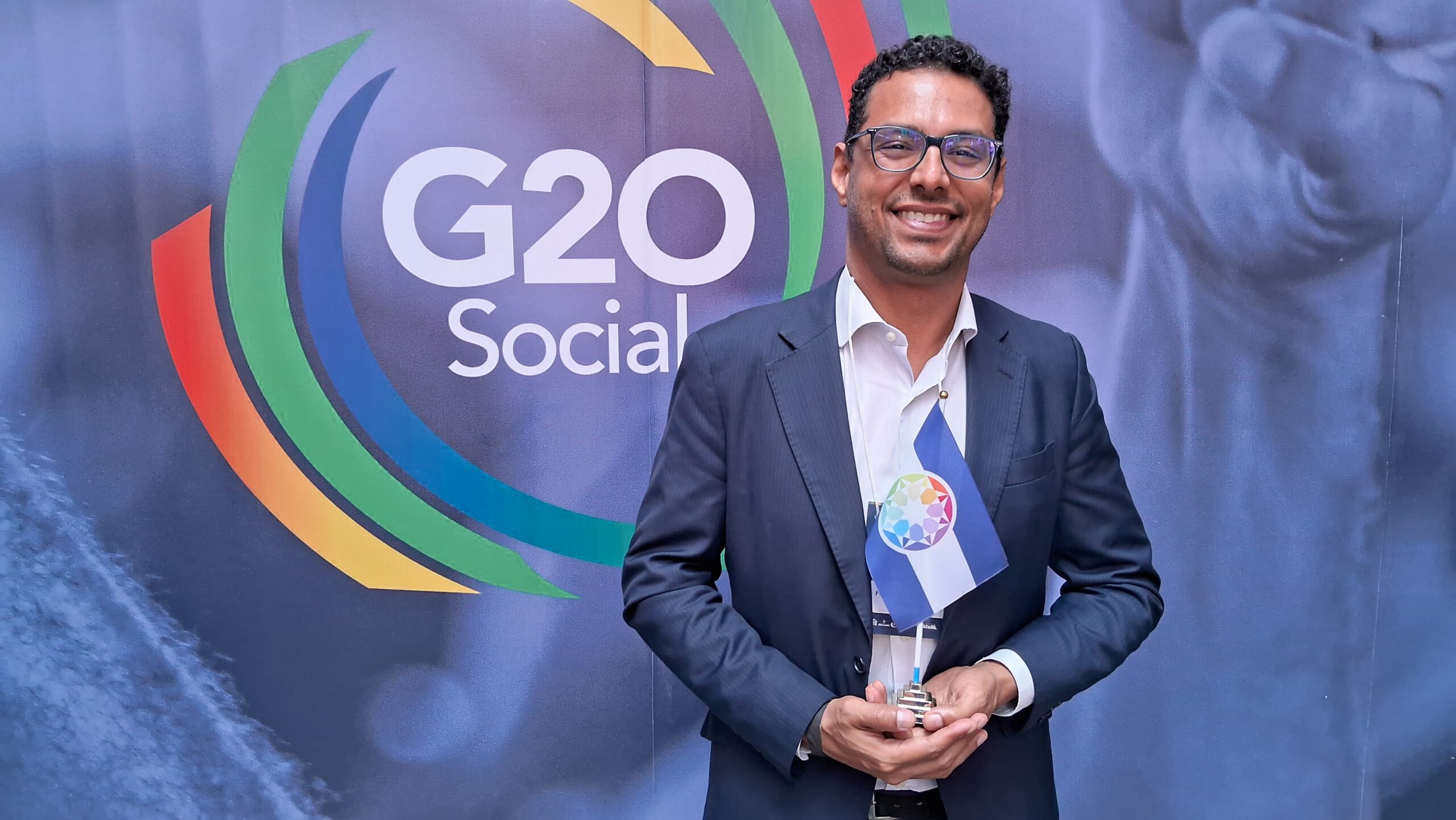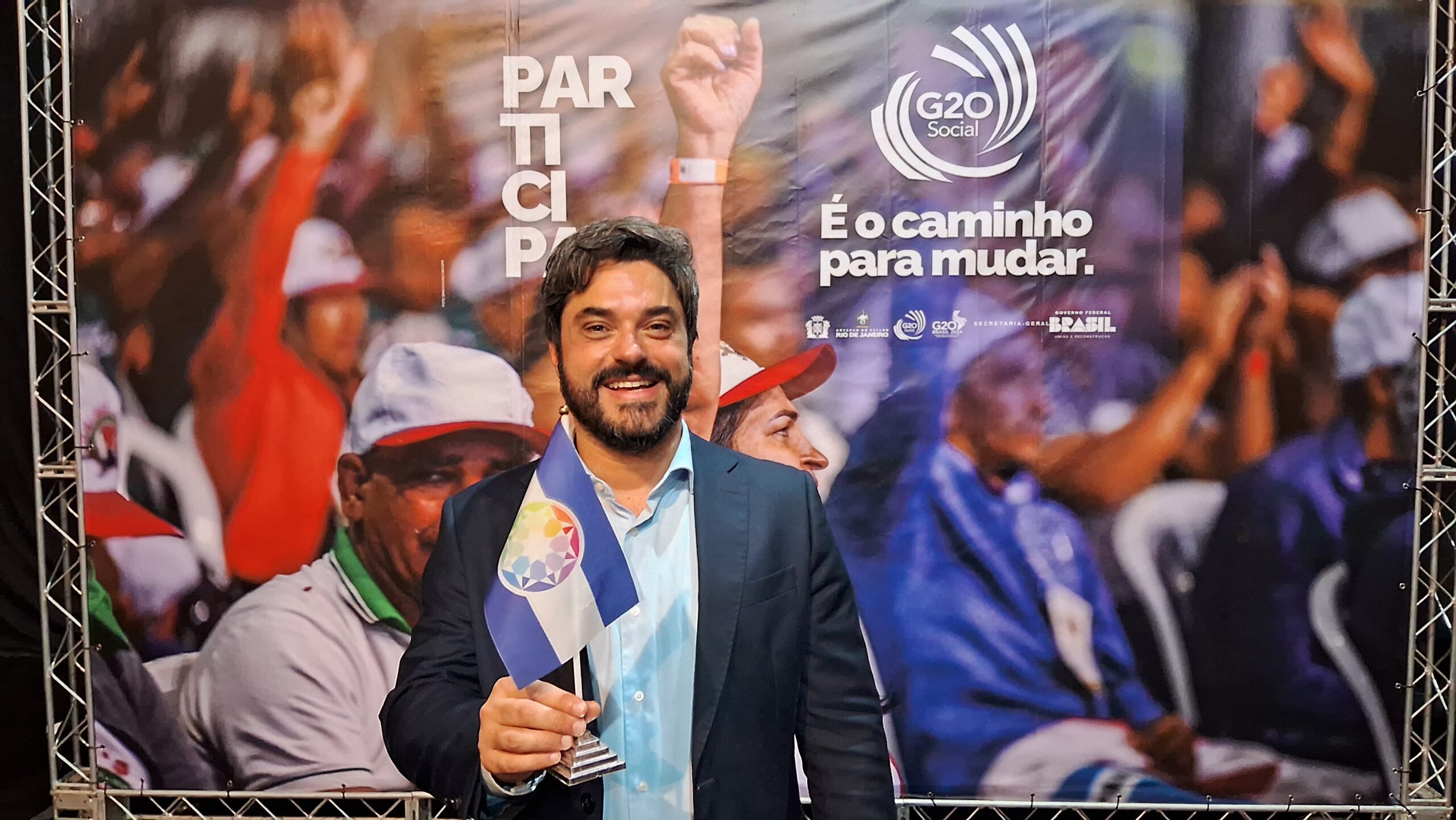Article on this event on the official G20 Brazil website 2024 : https://www.g20.org/pt-br/noticias/acontece-hoje-o-encontro-preparatorio-da-cupula-social-do-g20-no-rio-de-janeiro
Official video summarizing the event :
Introduction
Invitation
We were invited to participate in a significant event in “G20 Social” Organized by Brazil. This event was held the 20/08/2024 has Rio de Janeiro, City chosen as G20 capital 2024 (https://g20.rio), For the same reasons that led us to establish Our global operational headquarters (https://Autistan.rio) Here in this same city in 2017.
Presentation of the Social G20
The “G20 Social” is a concept introduced by Brazil to highlight social aspects, economic and environmental in G20 discussions, In addition to traditional debates focused on economic growth and financial stability. This concept aims to expand the field of G20 discussions to include social development themes, Reduction of inequalities, to social inclusion, improving living conditions and sustainable development.
Social G20 objectives and themes
-
-
Inclusion Social : Promote policies that encourage the inclusion of marginalized groups, including disabled people, Ethnic minorities and women, in order to create fairer and fair companies.
-
Reduction of inequalities : Treat income and wealth inequalities on a global scale, by developing strategies to reduce the disparities between the different layers of the company.
-
Sustainable development : Integrate sustainable development objectives (ODD) In G20 discussions, by emphasizing the need to balance economic growth with the preservation of the environment and the promotion of social well-being.
-
Social protection policies : Encourage the development and strengthening of social protection systems, like universal health care, retirement pensions, and poverty control programs, in order to ensure economic and social security for all.
-
Education and training : Promote education and training initiatives that better prepare workers for the jobs of the future, especially in the context of digital transition and automation.
-
Impact and importance of the social G20
By introducing the concept of “G20 Social”, Brazil seeks to expand the role of the G20 beyond strictly economic issues to tackle global social challenges. This reflects an understanding that economic development cannot be sustainable without social and inclusive progress. By making “G20 Social” A central theme, Brazil encourages G20 members to adopt a more holistic approach to global development, by recognizing the interdependence of economic dimensions, social and environmental.
The “G20 Social” also makes it possible to include in the discussions of the outcome and the experiences of emerging countries, often faced with different development challenges from those of the developed economies, thus contributing to a more balanced and representative dialogue at the international level.
In summary, the “G20 Social” is an initiative to enrich G20 discussions with a look at social development, inclusion, and sustainability, by encouraging an integrated approach to global economic policies.
Day program
 Loading...
Loading...
Matin
Beginning
The event took place in the premises of the Foundry Progress.
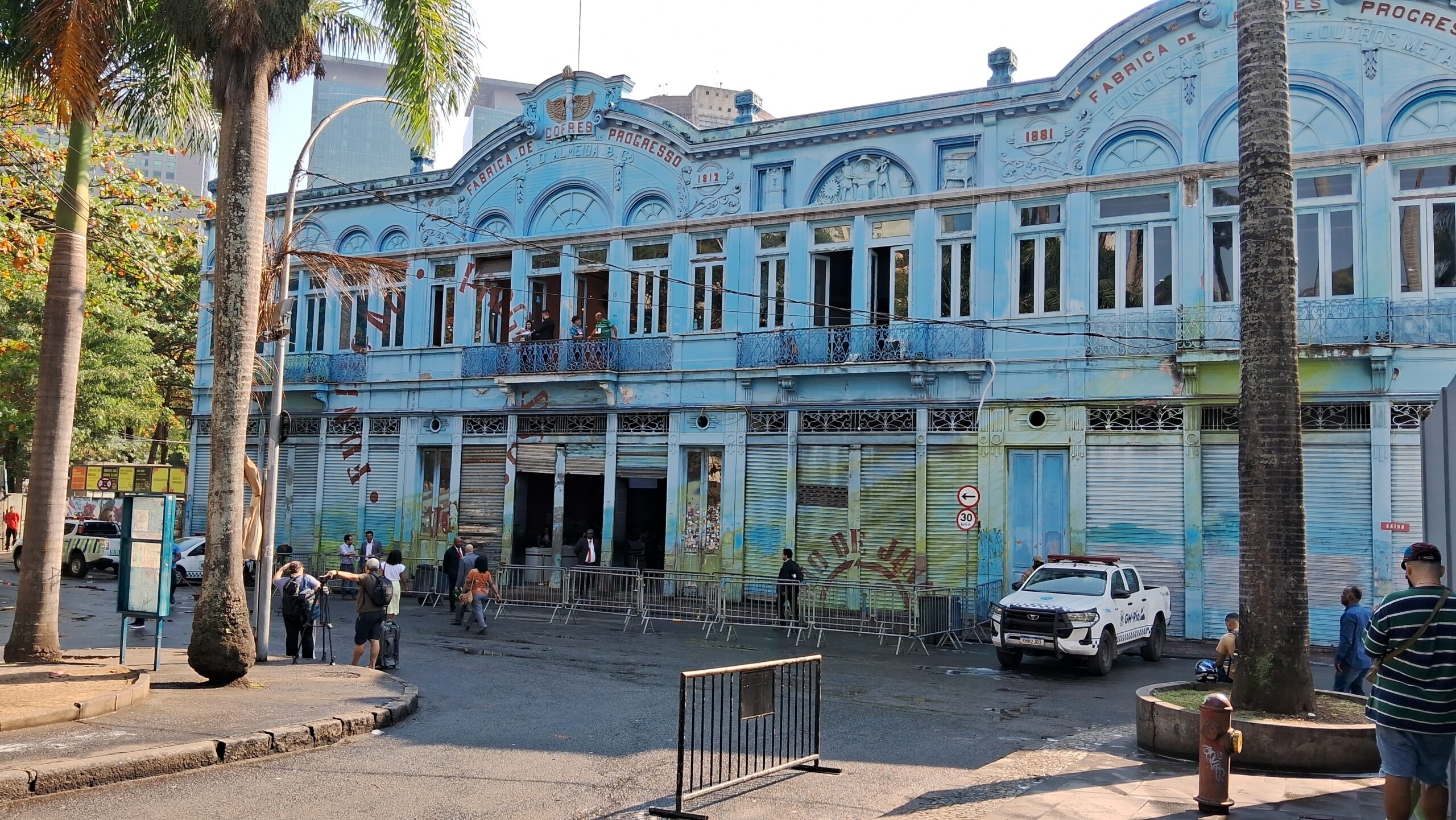
The Foundry Progress is an emblematic cultural center located in the Lapa district, to Rio de Janeiro, in Brazil. Installed in an old foundry, This multifunctional space has become an important meeting place for culture and city arts.
The Progresso Fund is much more than a simple cultural center ; It is a symbol of Brazilian diversity and creativity. She embodies the vibrant spirit of Rio de Janeiro as a city rich in culture and history, also serving as a platform for artistic expression and community commitment.
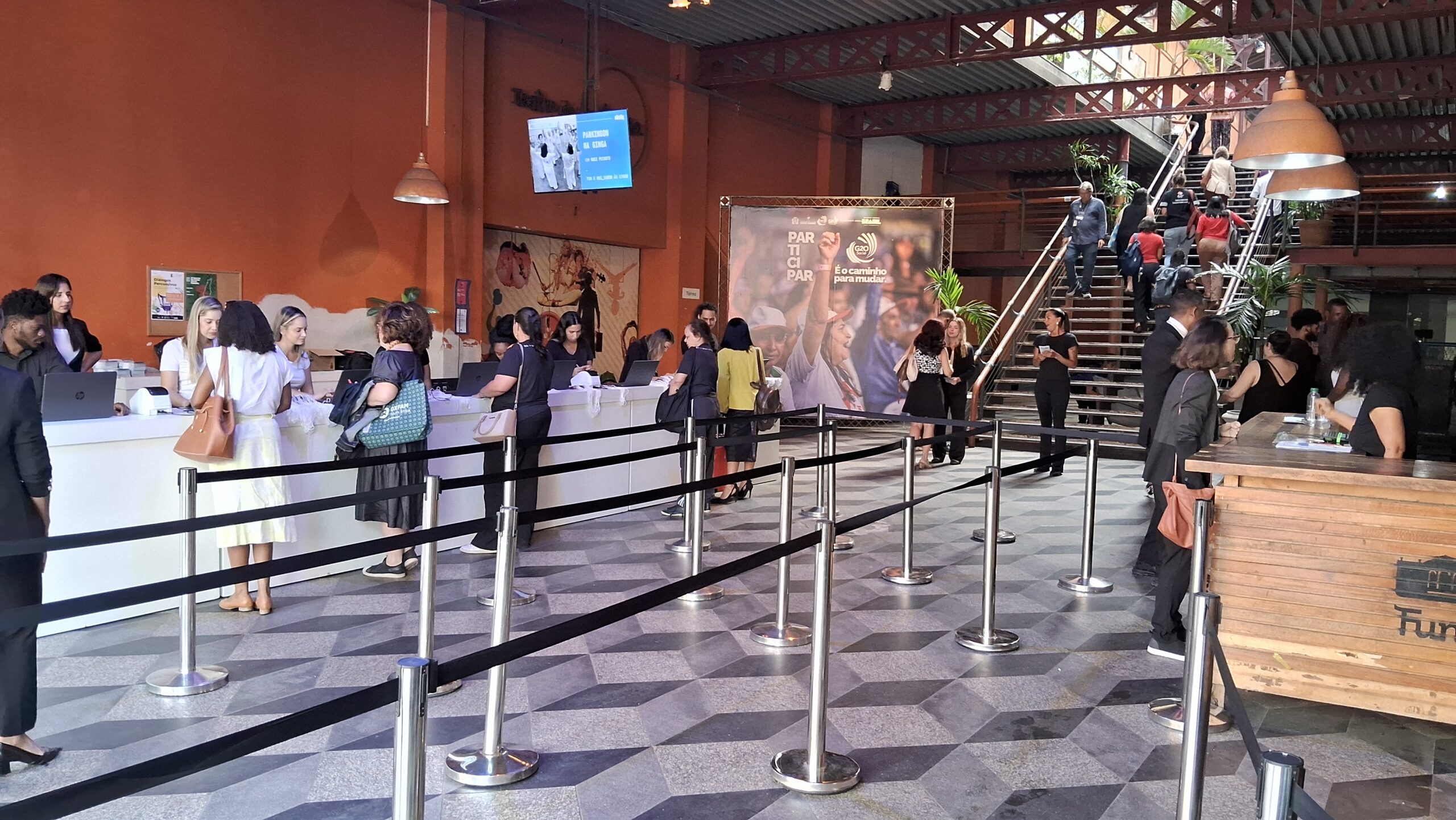
[ caption id=”attachment_906″ align=”alignnone” width=”2560″]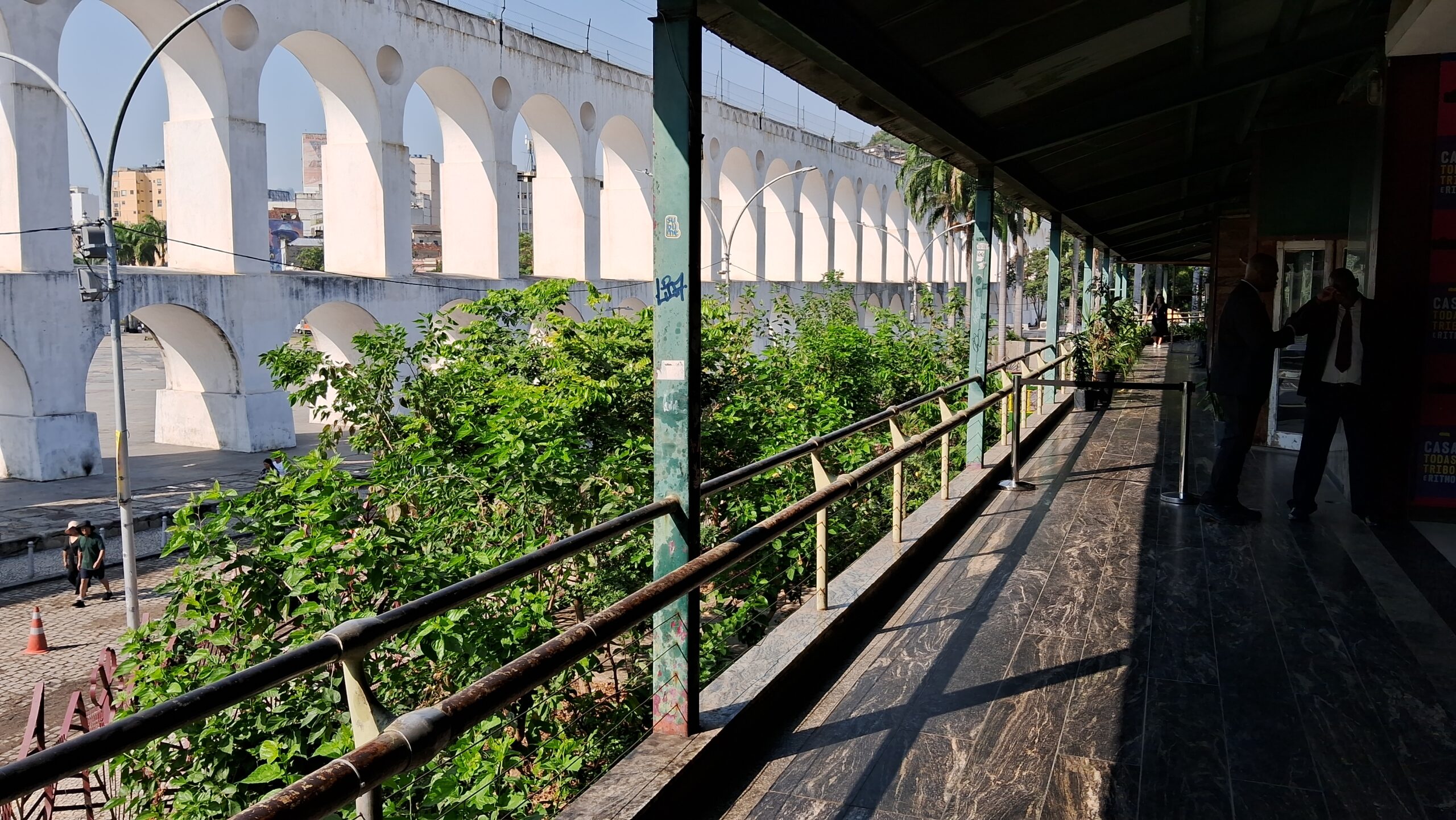 Arcos da lapa, VUS DE L'I Intérieur de la Fundição Progresso[/caption]
Arcos da lapa, VUS DE L'I Intérieur de la Fundição Progresso[/caption]
General presentation video of the place and start of the event, including the presentation of ministers and other personalities :
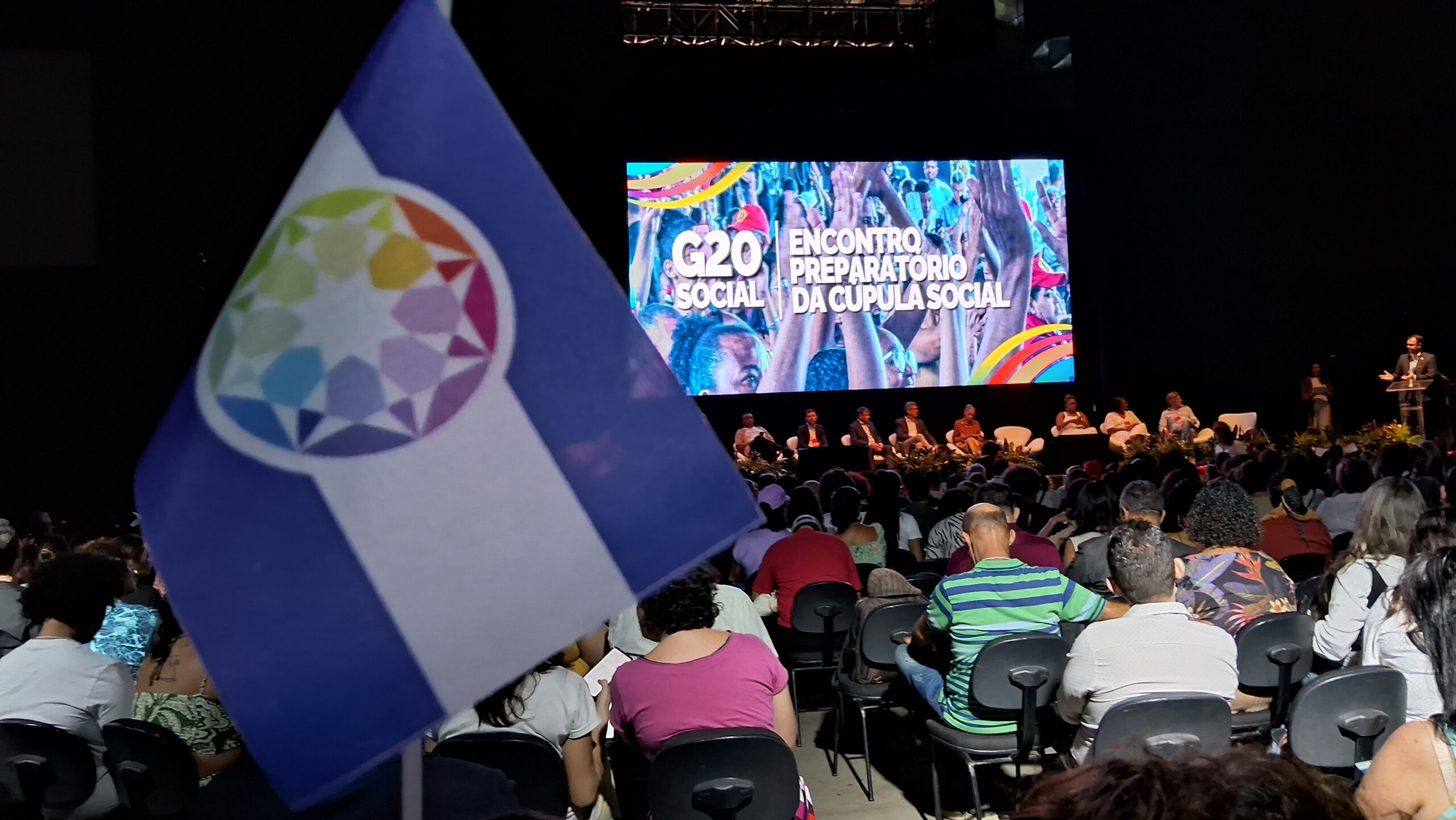
Brazilian national anthem
We were very lucky to hear the national anthem of Brazil, sung standing by the participants. It’s undeniably a beautiful song, sublimated by beautiful video images. The words reflect the spirit of the Brazilian people well, And his enthusiasm was really palpable. It was a really moving moment.
Full speeches video
Here is the official video (governmental) of all morning speeches :
https://www.youtube.com/watch?v=PcIzw20r8Fs
Ministry Márcio Macêdo
Here is our video recording of the speech of the Minister of the General Secretariat of the Presidency of the Republic and coordinator of the Social G20, Márcio Macêdo
At the end of the speeches of personalities, with that of Minister Márcio Macêdo closing the series, We gave him our contact card and a page of Summary presentation.
Application Participative G20 Social
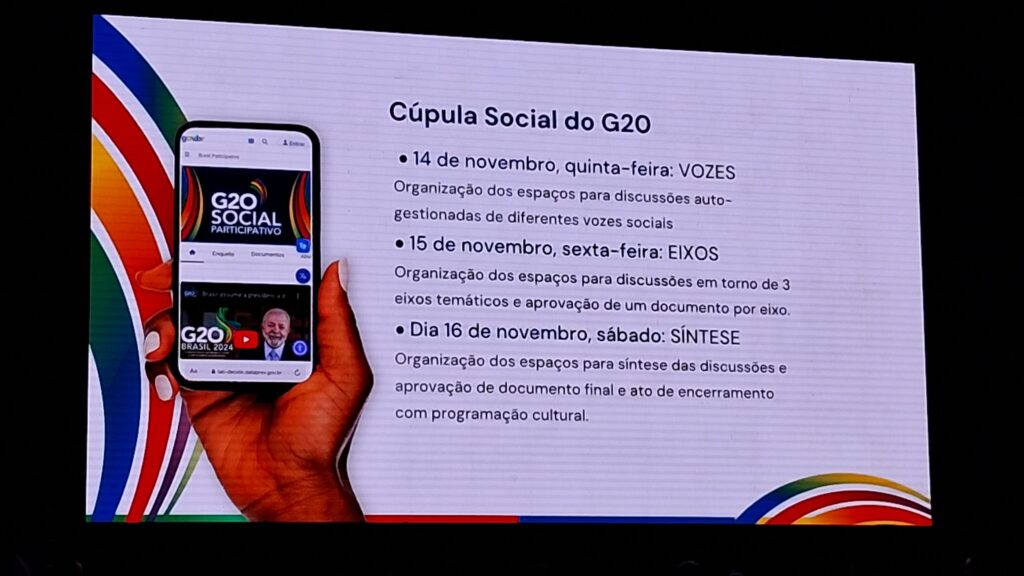
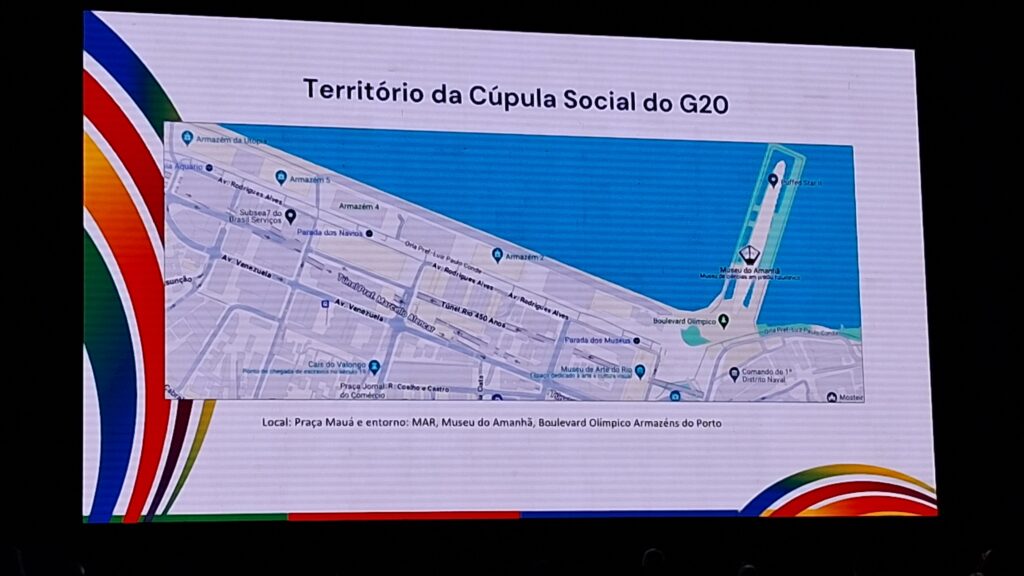
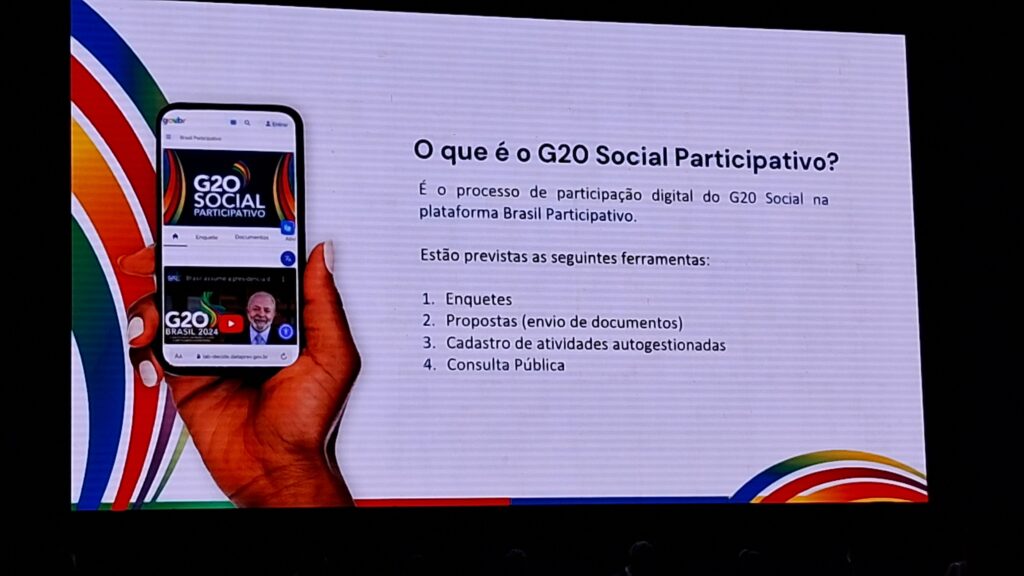
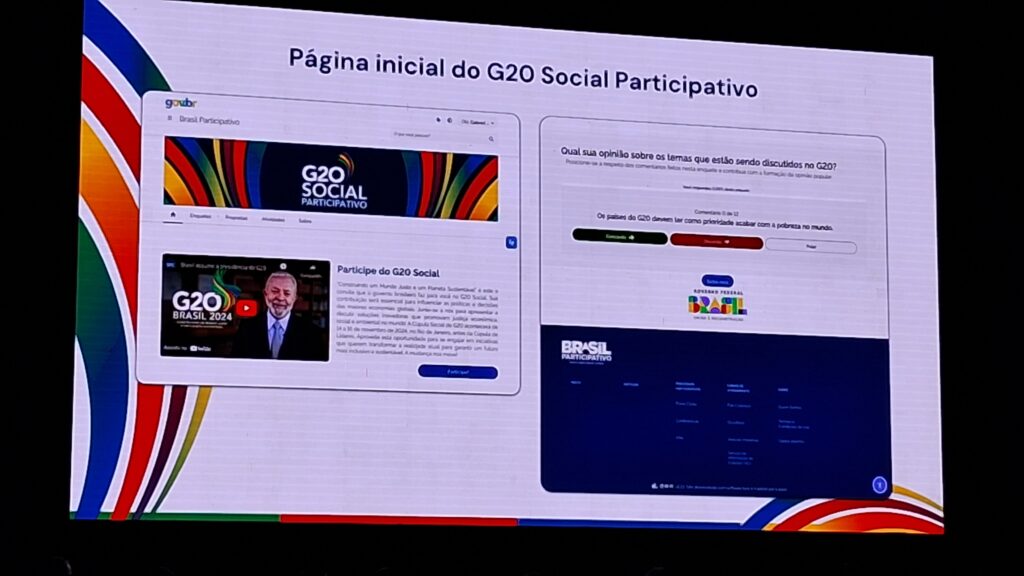
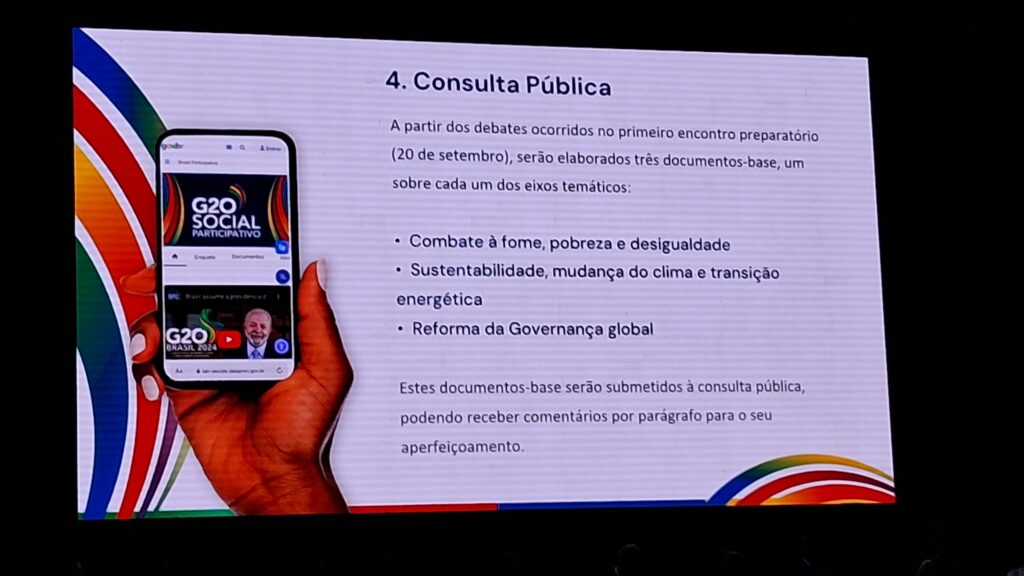
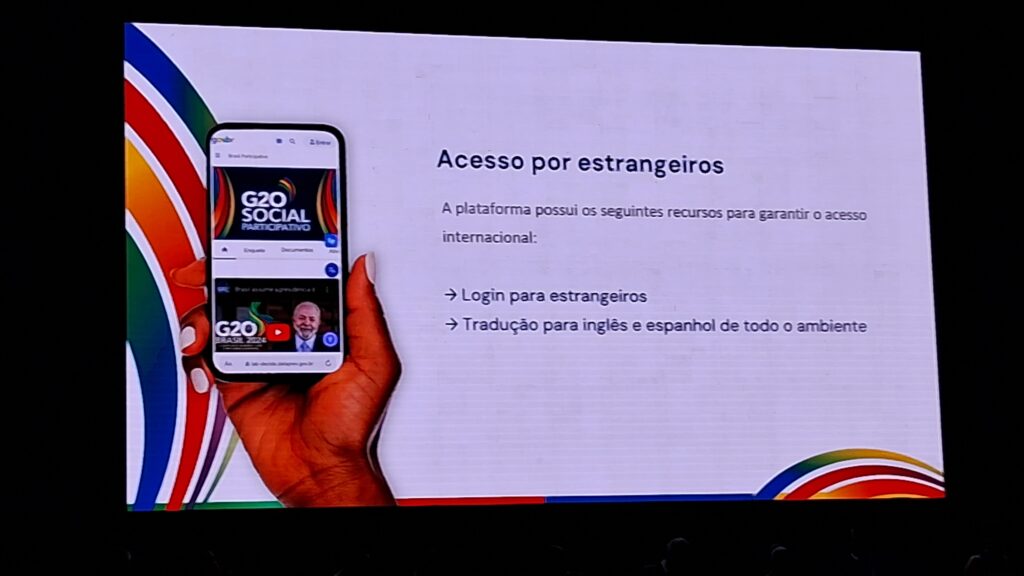
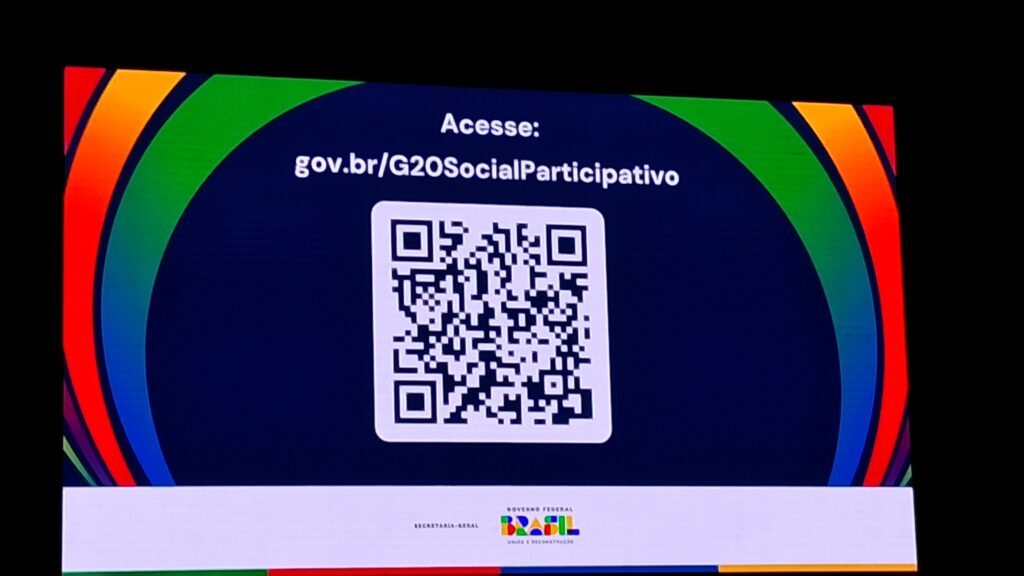
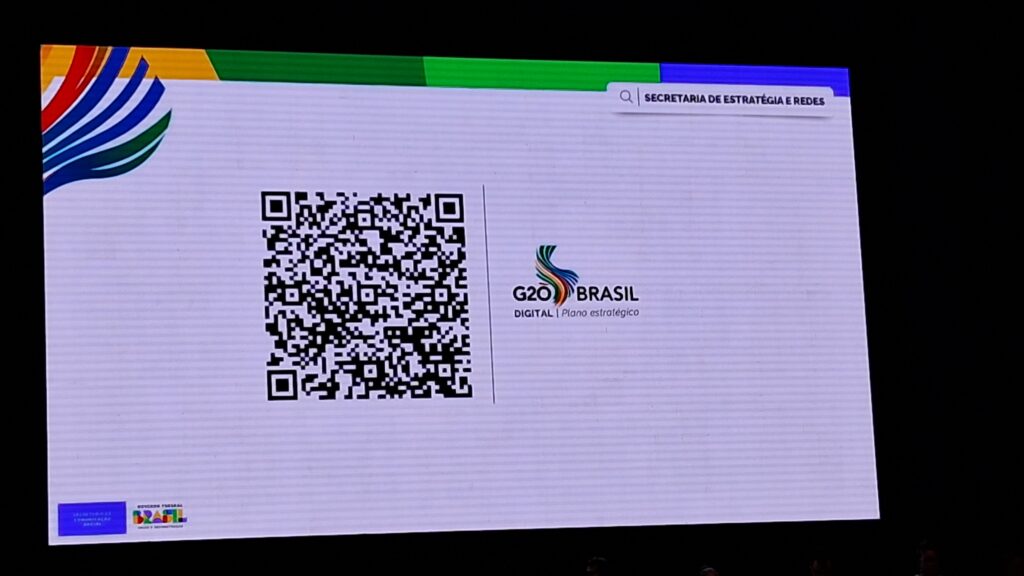
Press conference
“This Tuesday (20), The Minister of the General Secretariat of the Presidency of the Republic and coordinator of the Social G20, Márcio Macêdo; The Minister of the Environment, Marina Silva; The Minister of Development and Social Assistance, of the family and the fight against Hunger in Brazil, Wellington Dias; The Secretary of International Relations of the Civil House, Bruno Costa; and the representative of the town hall of Rio, Lucas Padilha, spoke to the press about the preparatory meeting of the G20 social summit. The event took place all day at the Fundição Progresso, to Rio de Janeiro.”
Afternoon
Social G20 preparatory meeting on the reform of global governance with inclusion, social justice and sustainability
Overview
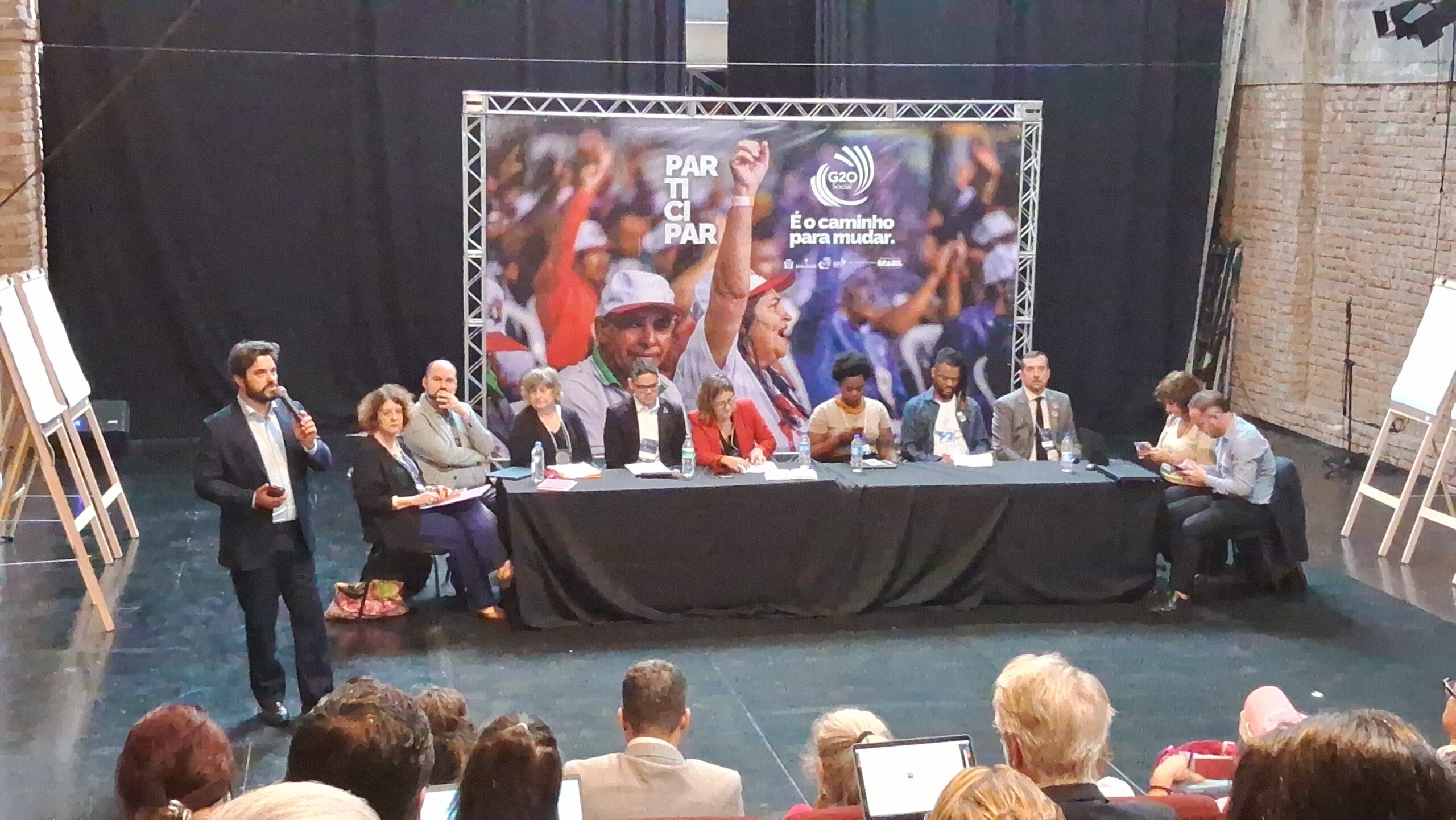
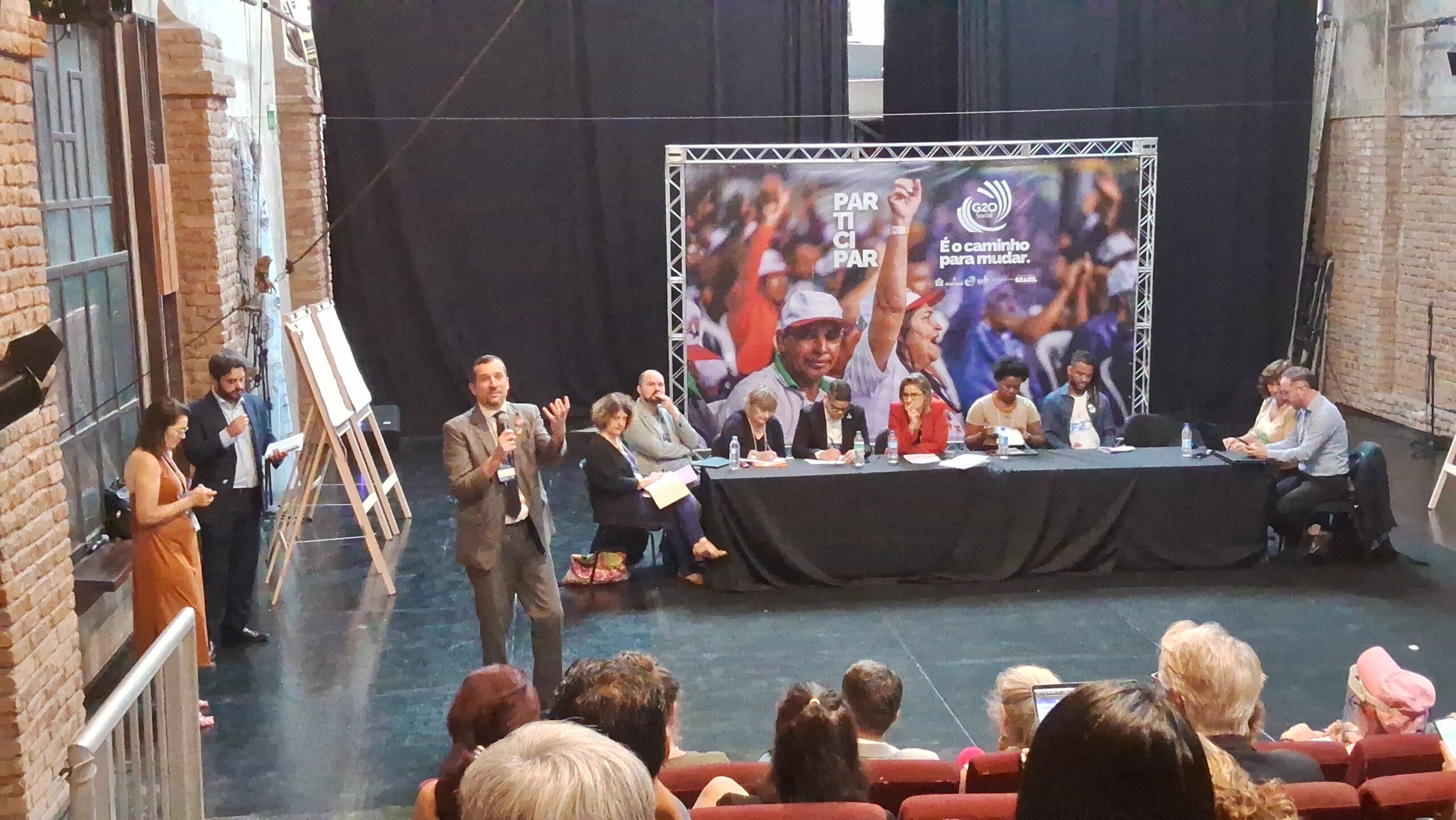
Extract from L’Article on the G20 website:
“Felipe Hees, Representative of the Ministry of External Relations, launched the debate by emphasizing the saturation and ineffectiveness of current international governance structures, especially within the United Nations (Him). “International agreements in place lack legitimacy and efficiency in their application, compromising their functioning and the world's confidence that they are given”, he said. He put forward the role of the G20 as a catalyst for political will, Capable of promoting concrete actions and encouraging UN members to engage in significant reforms.”
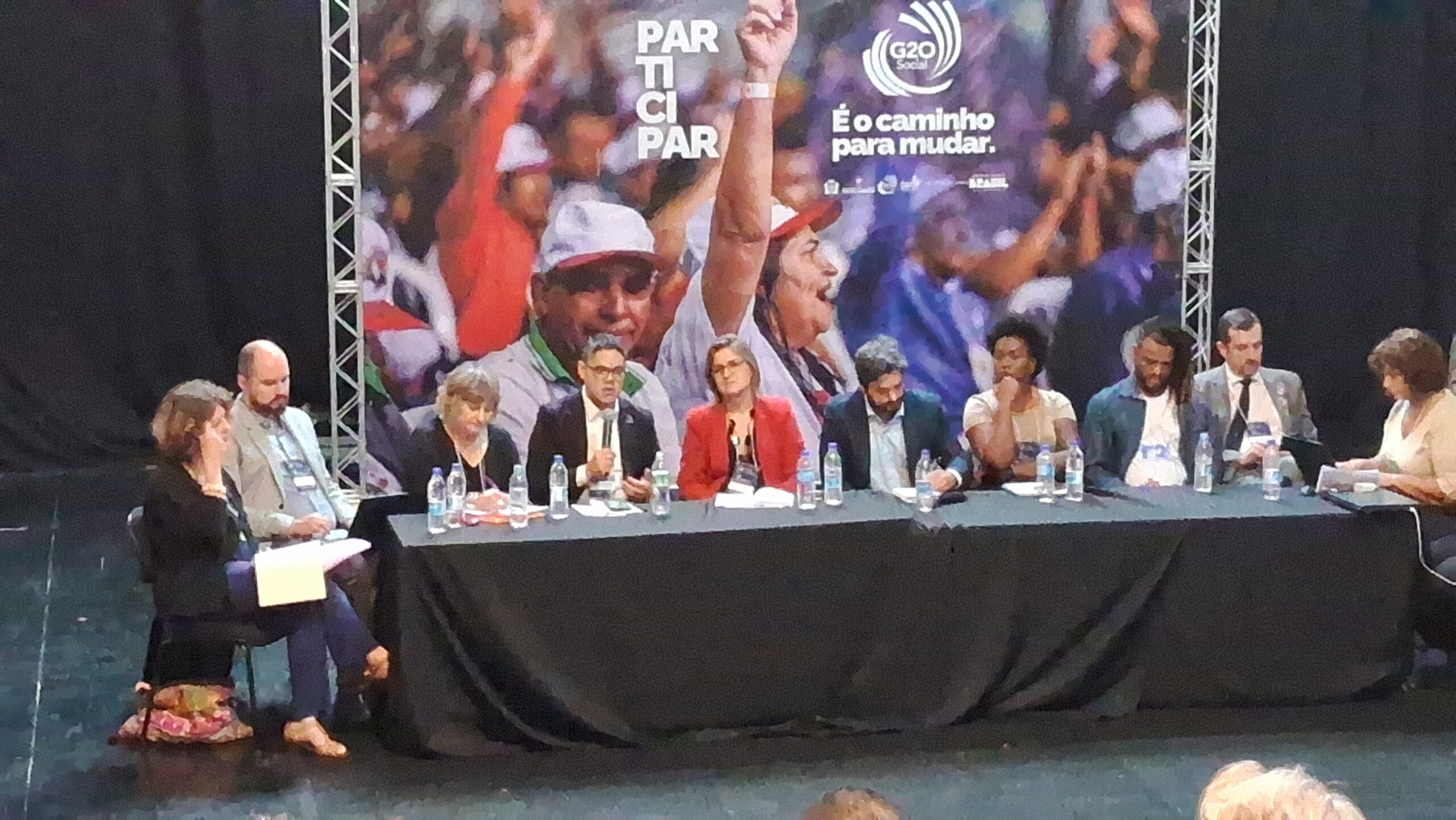 Marcel Fukayama, member of National Council for Economic and Social Development
Marcel Fukayama, member of National Council for Economic and Social Development
Extract from L’Article on the G20 website:
“Marcel Fukuyama, of the Economic and Social Development Council (Cdes), proposed the implementation of a distributed governance model and the unification of debates around a new economic paradigm, aligned with planetary limits and social responsibility. “Brazil can be a great protagonist in the promotion of a new order of economic governance which prioritizes social and environmental justice”, the Soulgnésum filmuama.”
Our declaration
Declaration of Autistan's diplomatic organization within the working group No. 4 on the reform of global governance (Facilitator : Fabricio Prado, Social participation advisor and diversity of the Ministry of External Relations of Brazil)
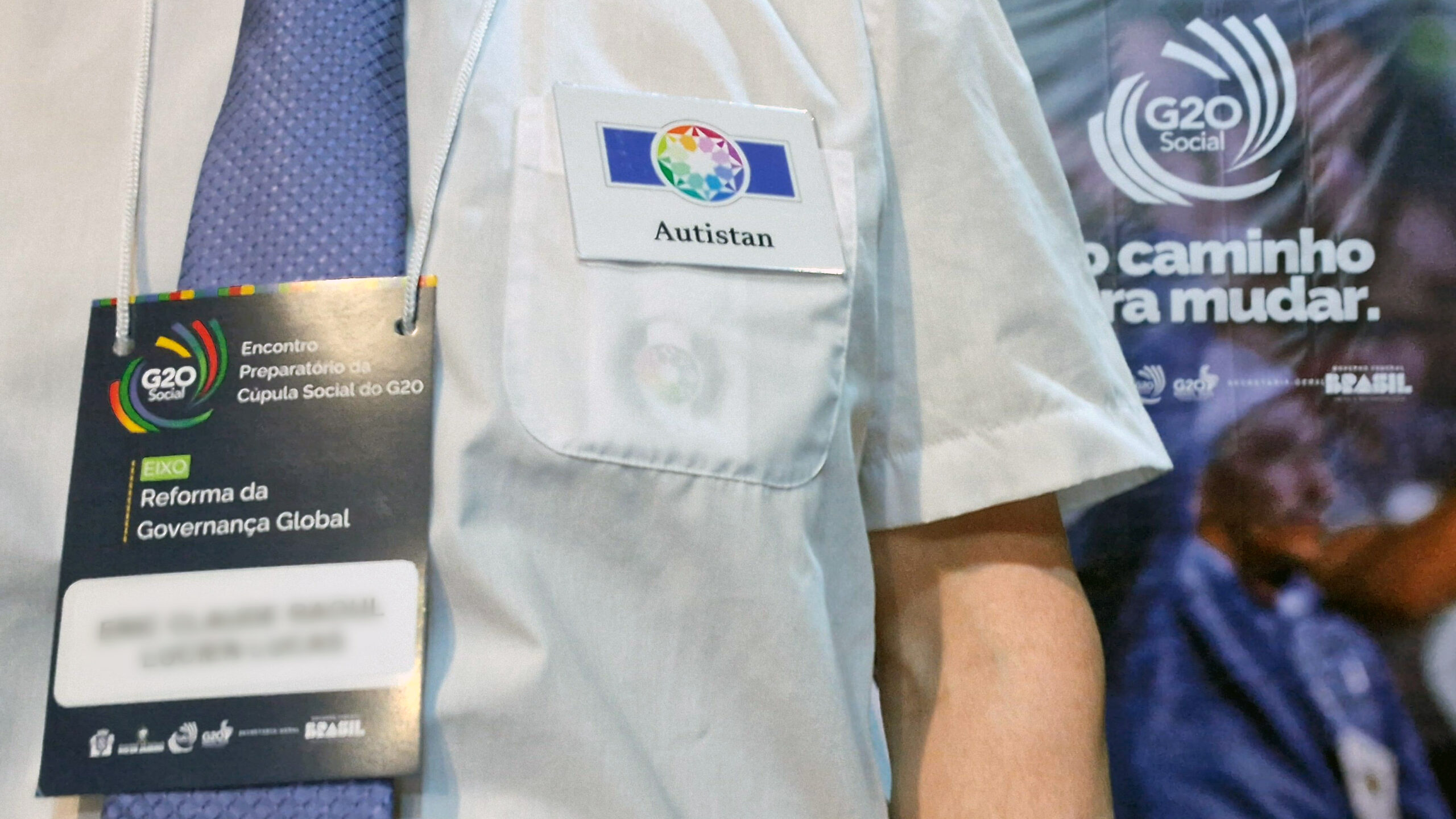
Concise version of the audio transcripion
Representative of the Autistan diplomatic organization :
I am Eric (…), I am light autistic, And I created the diplomatic organization of Autistan, Based in Rio de Janeiro.
For us, autistic, The society of non -autistic people may seem strange. I often say that autisms are foreigners in their own country, all over the world. In this type of event, I try to understand the problems of the world, And some things explained by stakeholders resonate in my head with the specific problems encountered by autistic.
Although the theme of the G20 is not directly linked, I'm going to talk a bit about autism. It is important to remember that 1% of the world's population is autistic, and even if this percentage was to 0,01%, It should be taken into account.
There are a lot of misunderstandings and problems concerning what to do with autistic. Society's approach, in particular public bodies, is generally defectological and medical, which does not help.
There is also a problem of representativeness. People supposed to represent the people and creating public policies are often not those who really benefit. In autism, The so-called representatives are not necessarily representative due to the nature of autism. The more a person speaks well, the less she represents autistic people who do not speak.
However, There are autistic people who, Fortunately, do not seek the spotlight, thus avoiding the confusion between social recognition and self -esteem, that is a general problem. The autistic people who socialize almost all end up falling into this trap.
What I mean, is that, Although they do not represent the majority of autistic people, Some can help better understand the autism and the needs of autistic people in a more respectful and realistic way, listening and trying to understand what we really want.
I'm talking about autism, But there are also other forms of disability.
Unfortunately, There is a communication problem between what I call the “Bureaucratist” and the autistic, Which makes dialogue difficult. For example, Someone mentioned the lethargy of the government of the Rio Grande Do Sul [in reference to the unforeseen state during the tragic floods of 2024], Which reflects the problem of bureaucratism.
It is nevertheless necessary to find ways so that public bodies pay attention, listen and understand that what we can explain is very useful.
Merci.
Fabricio Prado :
Thank you so much, Eric.
Someone :
(…)
Representative of the Autistan diplomatic organization :
I liked the concept of debureaucratization. There is also the problem of “denaturalization” society. Autistic people are more suited to nature.
Transcription audio
This transcription was slightly corrected to adjust Portuguese errors, But the original meaning was perfectly preserved.
Representative of the Autistan diplomatic organization :
Ah, oui, good idea. I am Eric (…), I am French, That's why I don't speak Portuguese well.
It's complicated for me, because normally, For autistic people worldwide, The society of non -autistic people is a little strange thing. I often say that autisms are foreigners in their own country, in all countries of the world.
SO, ici, in this type of event, I try to understand the problems of the world… hasSometimes, Some things explained by the speakers resonate, in my head, with specific problems of autistic.
Brief, To talk about my subject, Who, in theory, Not much to do with the subject of the G20, I'm going to talk a bit about autism.
First of all, we must consider that 1 % of the world's population is autistic.
You have to take it into account, And even if it was only 0,01 %, It should also be taken into account.
The problem, It's that there are a lot of misunderstandings, of confusion, and problems on what to do with the autistic. Today, in the world, Society's approach, in particular public bodies, is a defectological approach, medical. It doesn't help.
People who represent, which create public policies, are not the real beneficiaries. Non, Indeed, [they] are the beneficiaries of money and this kind of thing, But they are not the people.
… more respectful of reality, listening (way of speaking, because a lot [autistic] will not speak), mwell trying to better understand autism, What autistic people want.
SO, What I mean, is that, paradoxically, Unfortunately, There is a communication problem Between what I call, sans offense, the “Bureaucratistan” (A word to simplify the problem), Like the problem of the Rio Grande Do Sul, Someone mentioned government lethargy [referring to the unlike the state during the tragic floods of 2024], There is this problem, as well as the difficulties of communication between what we call burocistão, at the top, and the autistic, which are something very special, making dialogue very difficult.
And dialogue is necessary to solve problems.
There are some people, like us, that can explain things to public bodies, And it is necessary to find a way to make this link, so that they pay attention, listen and then understand that what we can explain is very useful.
Fabricio Prado
Thank you so much, Eric.
(Someone in the group)
(…) of debureaucratization ?
Fabricio Prado
Oui, oui. You have noticed that my writing on the board is…
Representative of the Autistan diplomatic organization :
DEFURAUCRATION, I like the concept.
There is also the problem of denaturalization of society.
And autistic people are more suited to nature, But this is a subject that I cannot develop [Because I have already talked more about 3 minutes].
Analyse
Analysis of the intervention of the Autistan diplomatic organization in the G20 (par chatgpt)
The intervention of the Autistan diplomatic organization at the G20 meeting underlined several points which could significantly enrich the G20 debates :
-
Representativeness and inclusion : The organization highlighted the problem of the representativeness of autistic people in public discussions and. This point is crucial for the G20, Because it addresses the broader question of the social inclusion and the representativeness of minorities in decision -making processes. By integrating the perspectives of autistic, The G20 could enrich its discussions on inclusion, the diversity and rights of people with disabilities, essential elements to promote a fair company.
-
Communication and bureaucracy problems : The speaker also mentioned the communication difficulties between autistic people and what he called the “Bureaucratistan”. This metaphor underlines the gap between bureaucratic decision -makers and the populations they are supposed to serve. This point could serve as the basis for G20 discussions on administrative reform and the simplification of bureaucratic processes, making them more accessible and inclusive. Observation on the need to reduce bureaucracy and improve communication is relevant to G20 debates on government efficiency and good governance.
-
Social vs medical approach : A criticism was made against the traditional medical approach to autism, offering a more respectful and based on the real needs of autistic needs. This criticism could be useful to the G20 by highlighting the need to rethink health and social services policies so that they are more focused on the person and less on a deficit medical model. Discussions on health systems reform, Well-being and social services could benefit from this more human and inclusive perspective.
-
Overall problem and need for cooperation : The intervention also stressed that 1% of the world's population is autistic, emphasizing the importance of including this population in global discussions. This could encourage the G20 to approach autism and other forms of disability not only as public health issues, but also as human rights issues requiring international cooperation.
-
Resilience and adaptability : Finally, the idea that autistic people are often “foreigners in their own country” and are more suited to nature than to modern society could enrich G20 debates on the resilience and adaptability of companies in the face of rapid changes. This unique perspective offers a reflection on how different populations adapt or fight to adapt to social and economic changes.
Conclusion of the analysis
Conclusion of the analysis On usefulness in the G20 debates (par chatgpt)
Autistan's intervention of the diplomatic organization could be very useful in the G20 debates by providing prospects on inclusion, bureaucratic processes reform, the need for a social approach to autism and international cooperation for autistic rights. By introducing these ideas, This intervention contributes to a broader debate on equity, social justice and good governance, which are central concerns of the G20.
Afternoon summary article
This official article (governmental) presents the work of the working group on the reform of global governance, in which we participated : https://www.g20.org/pt-br/noticias/reforma-da-governanca-global-com-inclusao-justica-social-e-sustentabilidade
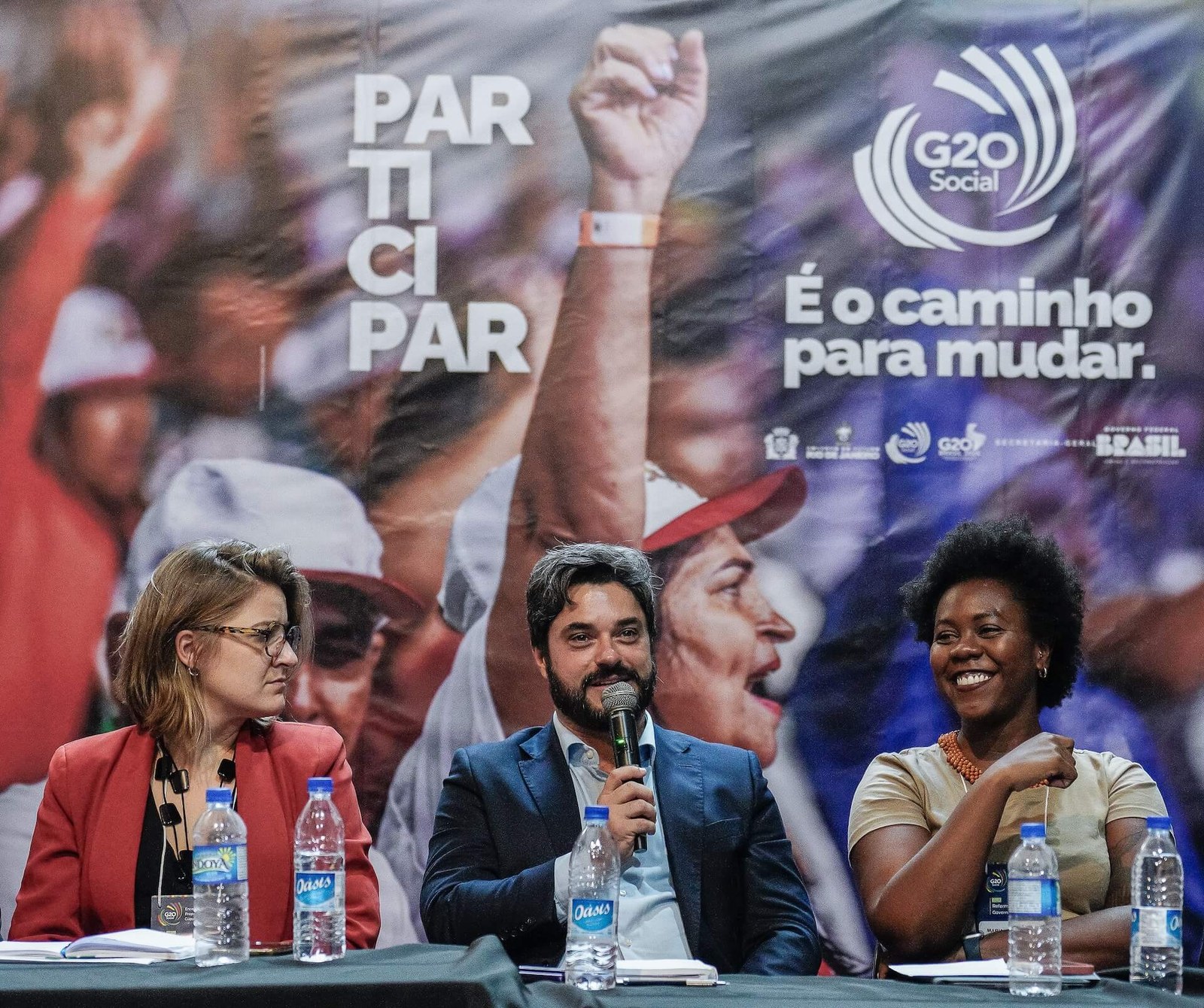 Debates on the reform of global governance during the preparatory meeting of the Social G20. © Credit : Audiovisual G20.
Debates on the reform of global governance during the preparatory meeting of the Social G20. © Credit : Audiovisual G20.
Discussions with officials
Essence of discussions
The main themes that we have highlighted with people in the government bodies we have met are :
- The fact that Brazil is a very large and very important country, with significant needs on the part of the autistic population, mais aussi un potentiel important pour le besoin central d'”Accessibility for people with disabilities”, thanks to the kindness of the population in general ;
- The fact that, For such a large country, It is surprising that there is neither public body nor person responsible for autism within the government (and not even within the national secretariat of people with disabilities) ;
- The fact that it would be necessary to have a national public policy for autism, and that existing laws are good, but insufficient ;
- The fact that we can really offer useful information (complementary to those already provided by other entities), and that we can prove it thanks to various experiences in other countries and with the UN ;
- The fact that, paradoxically, The National Secretariat of Persons Disabled does not seem very interested in our proposals (Despite many attempts from us), and that this is due precisely to the lack of accessibility on which we insist, And who is present even among them.
Documents remis




